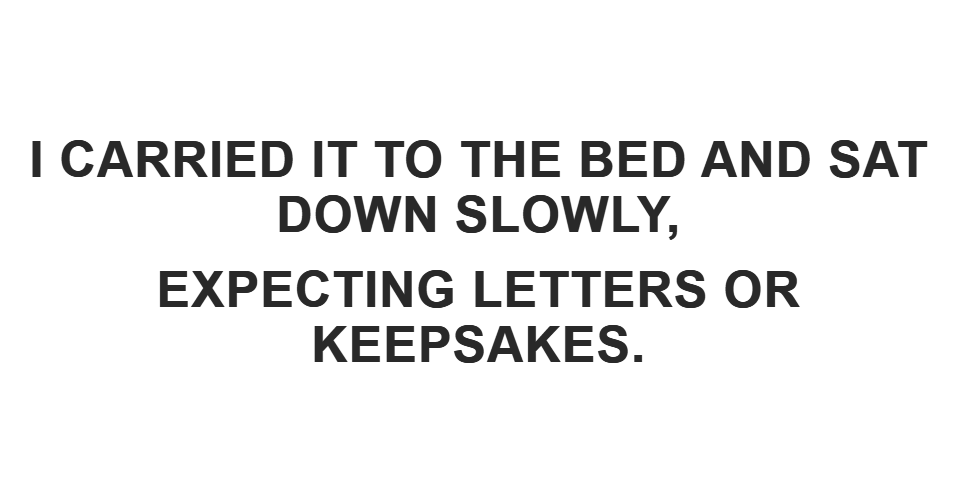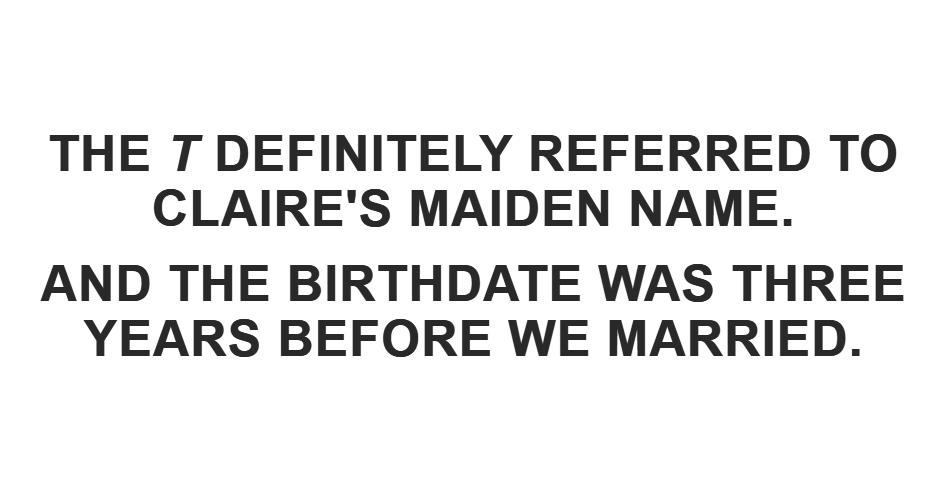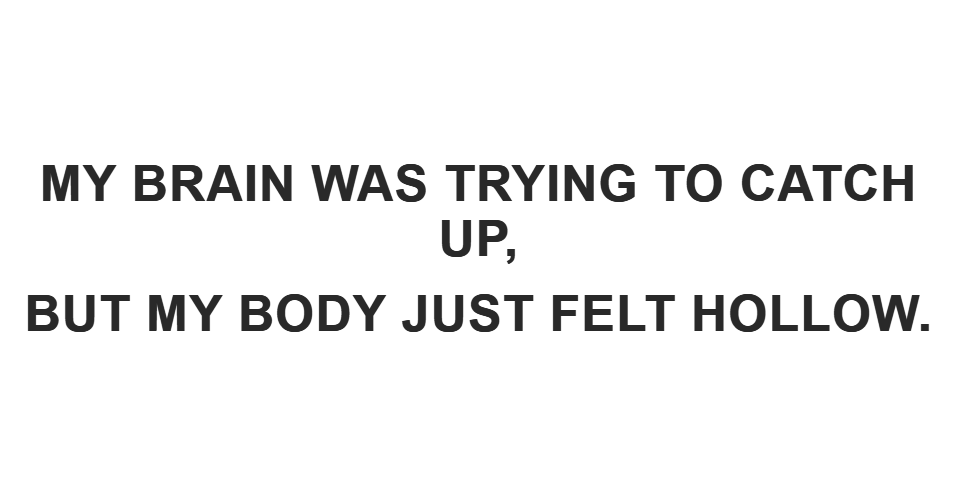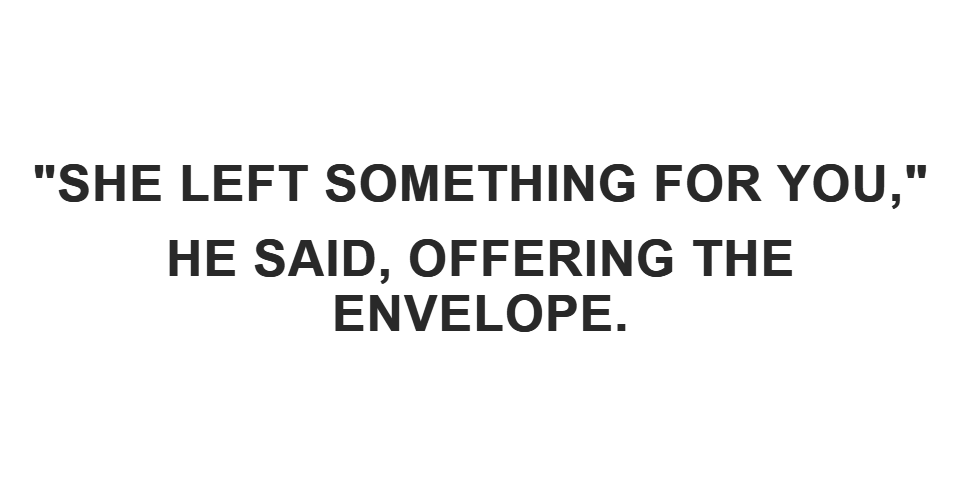When James loses his wife, he thinks grief is the hardest thing he’ll face — until he discovers a hidden truth buried in a box of her belongings. As secrets unravel, he’s forced to confront the life he thought he knew… and the family he never expected to find.
The day my wife, Claire, died, the house seemed to forget how to breathe.
Sunlight streamed through the living room windows like it always had, casting soft gold across the rug and warming her favorite chair. But the light felt off, hollow somehow, like it didn’t know where to land anymore.
I stood in the doorway, staring at that chair like it might still remember her better than I could.
“You’ll never win an argument standing in a doorway, James,” she used to say, raising one brow over the rim of her book. “Come sit and face the music with me.”
I could still hear her voice, teasing, knowing… and for a moment, it stopped me cold.
She said that the day I suggested we paint the kitchen beige.
When James loses his wife, he thinks grief is the hardest thing he’ll face — until he discovers a hidden truth buried in a box of her belongings. As secrets unravel, he’s forced to confront the life he thought he knew… and the family he never expected to find.
The day my wife, Claire, died, the house seemed to forget how to breathe.
Sunlight streamed through the living room windows like it always had, casting soft gold across the rug and warming her favorite chair. But the light felt off, hollow somehow, like it didn’t know where to land anymore.
I stood in the doorway, staring at that chair like it might still remember her better than I could.
“You’ll never win an argument standing in a doorway, James,” she used to say, raising one brow over the rim of her book. “Come sit and face the music with me.”
I could still hear her voice, teasing, knowing… and for a moment, it stopped me cold.
She said that the day I suggested we paint the kitchen beige.

“Beige?” Her mouth had dropped open, full of theatrical offense.
“James, darling, we are not beige people.”
And we weren’t. Not then. Not ever.
She was my partner in everything — messy, maddening, and magic. And now she was gone.
The silence she left behind had weight. It pressed on the walls and settled into my skin. And it didn’t plan on leaving.
We had raised two children together, argued over nursery themes and parenting books, made up over tea in bed and quiet, late-night apologies. We had whispered beneath the covers about nonsense and poetry.
Her death had come quickly, far too quickly.
One week she was planning a weekend away at a quiet inn near the coast.
“I want a room with a balcony,” she said, folding her favorite cardigan with practiced ease. “And I want to sit outside with a good book, a cup of tea, and absolutely no emails.”
“You’re dreaming,” I teased. “You haven’t switched off your phone since 2008.”
She smirked, tucking a paperback into her tote bag.
“Then it’s about time, isn’t it?”
But the weekend never came.

Instead, we spent it in a hospital room surrounded by white walls and soft beeping.
Claire’s body failed her faster than anyone expected. Her voice grew thinner with each passing day. And on the last night, she reached for my hand and held it gently.
“You don’t have to say anything,” she whispered, her thumb brushing over mine. “I already know.”
I nodded, afraid my voice would crack if I tried to speak.
After the funeral, I drifted through the house in a fog. Her chamomile tea still sat cold on the nightstand. Her glasses were folded neatly beside the last book she’d been reading. It was as if she had just stepped out of the room for a moment and would return any second.
Only she wouldn’t…
and I couldn’t bring myself to move any of her belongings.
Three days later, I went looking for her will. That was when I found the box.
It was buried in the back of our bedroom closet, beneath winter coats, a stack of old photo albums, and the heavy silence that had been growing since the day Claire passed. I pulled it out, brushing away a thin layer of dust.
The box wasn’t labeled, but the tape along the edges looked newer than I expected. Claire must have sealed it herself, not long ago.
I carried it to the bed and sat down slowly, expecting letters or keepsakes.
Instead, the first thing I saw was a manila envelope. I opened it without thinking.
And my breath caught.
It was a divorce decree.

My name. Her name. A judge’s signature.
Dated twenty-one years ago.
I froze. Maybe it was never filed? But the signatures were real.
Mine was tight. Hers graceful.
“Claire,” I whispered.
“What is this?”
I tried to remember that period of our lives. But the accident… the coma… the memory loss. So much was missing.
She had never filled in more than I asked. And maybe I hadn’t asked enough.
We had celebrated our 30th anniversary last year.
We had toasted. We had laughed. We had been married.
Or so I thought.
I dug deeper into the box. Beneath the decree was another envelope.
Inside: a birth certificate.
Lila T.
Female. Born May 7, 1990.
Mother: Claire T.
Father: Unlisted.
A daughter.
A daughter Claire had never told me about.
Born three years before Claire and I married.
My wife had lived an entire chapter of her life without me — and never spoken a word.
Had I asked for the divorce? Was it mutual? Had she wanted to tell me?
My head spun.
Then came the knock at the door.
A man in a charcoal suit.
“James? I’m Mr. Johnson. Your wife’s attorney.”
He handed me an envelope addressed in Claire’s handwriting.
Inside was a letter.
“My dearest James,
If you’re reading this, then I am gone…”
She explained everything.
Lila’s birth.
Her adoption.
The guilt.
The divorce she allowed while I was recovering, then never corrected.
“We found our rhythm again,” she wrote.
“I couldn’t let go.
You forgot the divorce.
And life moved forward as if nothing had changed.”
She wrote of Lila.
Of wanting me to reach out.
Of hoping I could be in her life.
“Always yours,
Claire.”

Four days later, I called the number Mr. Johnson gave me.
“Hello?”
Her voice was cautious.
“Is this Lila?
My name is James. I… knew your mother, Claire.”
Silence.
“She passed away last week.”
More silence.
“And… I think I’m your father.”
We met a week later in a café.
As she walked in, I felt something deep in my chest shift.
Claire.
She was there — in Lila’s posture, her mouth, her eyes.
“You’re him,” she said quietly.
She told me Claire had reached out once, years ago, but said little.
Over tea in her kitchen later, she told me another truth:
She worked in adult films.
Not by choice. But by survival.
“I’m not broken,” she said.
“I’m just tired of pretending I haven’t been through hell.”
“I’m not here to fix you,” I told her.
“I’m just here. If you want that.”
She hesitated, then touched my wrist.
“You can stay. And we can do a DNA test.
I’ll understand if you want nothing to do with me if you’re not my father.”
“Honey, I’ll stay irrespective of the results.
I wouldn’t blame you or Claire.”
And that was the beginning.
We found her a safe apartment.
Picked curtains.
Argued about toaster ovens.
She laughed for the first time in years — a real laugh — when my son joked about their matching chin dimples.
And slowly, softly, something new formed.
Grief didn’t leave me.
But it made space.
Claire was gone,
but in some way she had stitched us together —
me, Lila, our children.
Her final gift.
Her final plan.

“Beige?” Her mouth had dropped open, full of theatrical offense.
“James, darling, we are not beige people.”
And we weren’t. Not then. Not ever.
She was my partner in everything — messy, maddening, and magic. And now she was gone.
The silence she left behind had weight. It pressed on the walls and settled into my skin. And it didn’t plan on leaving.
We had raised two children together, argued over nursery themes and parenting books, made up over tea in bed and quiet, late-night apologies. We had whispered beneath the covers about nonsense and poetry.
Her death had come quickly, far too quickly.
One week she was planning a weekend away at a quiet inn near the coast.
“I want a room with a balcony,” she said, folding her favorite cardigan with practiced ease. “And I want to sit outside with a good book, a cup of tea, and absolutely no emails.”
“You’re dreaming,” I teased. “You haven’t switched off your phone since 2008.”
She smirked, tucking a paperback into her tote bag.
“Then it’s about time, isn’t it?”
But the weekend never came.
Instead, we spent it in a hospital room surrounded by white walls and soft beeping.
Claire’s body failed her faster than anyone expected. Her voice grew thinner with each passing day. And on the last night, she reached for my hand and held it gently.
“You don’t have to say anything,” she whispered, her thumb brushing over mine. “I already know.”
I nodded, afraid my voice would crack if I tried to speak.
After the funeral, I drifted through the house in a fog. Her chamomile tea still sat cold on the nightstand. Her glasses were folded neatly beside the last book she’d been reading. It was as if she had just stepped out of the room for a moment and would return any second.
Only she wouldn’t…
and I couldn’t bring myself to move any of her belongings.
Three days later, I went looking for her will. That was when I found the box.
It was buried in the back of our bedroom closet, beneath winter coats, a stack of old photo albums, and the heavy silence that had been growing since the day Claire passed. I pulled it out, brushing away a thin layer of dust.
The box wasn’t labeled, but the tape along the edges looked newer than I expected. Claire must have sealed it herself, not long ago.
I carried it to the bed and sat down slowly, expecting letters or keepsakes.
Instead, the first thing I saw was a manila envelope. I opened it without thinking.
And my breath caught.
It was a divorce decree.
My name. Her name. A judge’s signature.
Dated twenty-one years ago.
I froze. Maybe it was never filed? But the signatures were real.
Mine was tight. Hers graceful.
“Claire,” I whispered.
“What is this?”
I tried to remember that period of our lives. But the accident… the coma… the memory loss. So much was missing.
She had never filled in more than I asked. And maybe I hadn’t asked enough.
We had celebrated our 30th anniversary last year.
We had toasted. We had laughed. We had been married.
Or so I thought.

I dug deeper into the box. Beneath the decree was another envelope.
Inside: a birth certificate.
Lila T.
Female. Born May 7, 1990.
Mother: Claire T.
Father: Unlisted.
A daughter.
A daughter Claire had never told me about.
Born three years before Claire and I married.
My wife had lived an entire chapter of her life without me — and never spoken a word.
Had I asked for the divorce? Was it mutual? Had she wanted to tell me?
My head spun.
Then came the knock at the door.
A man in a charcoal suit.
“James? I’m Mr. Johnson. Your wife’s attorney.”
He handed me an envelope addressed in Claire’s handwriting.
Inside was a letter.
“My dearest James,
If you’re reading this, then I am gone…”
She explained everything.
Lila’s birth.
Her adoption.
The guilt.
The divorce she allowed while I was recovering, then never corrected.
“We found our rhythm again,” she wrote.
“I couldn’t let go.
You forgot the divorce.
And life moved forward as if nothing had changed.”
She wrote of Lila.
Of wanting me to reach out.
Of hoping I could be in her life.
“Always yours,
Claire.”
Four days later, I called the number Mr. Johnson gave me.
“Hello?”
Her voice was cautious.
“Is this Lila?
My name is James. I… knew your mother, Claire.”
Silence.
“She passed away last week.”
More silence.
“And… I think I’m your father.”
We met a week later in a café.
As she walked in, I felt something deep in my chest shift.
Claire.
She was there — in Lila’s posture, her mouth, her eyes.
“You’re him,” she said quietly.
She told me Claire had reached out once, years ago, but said little.
Over tea in her kitchen later, she told me another truth:
She worked in adult films.
Not by choice. But by survival.
“I’m not broken,” she said.
“I’m just tired of pretending I haven’t been through hell.”
“I’m not here to fix you,” I told her.
“I’m just here. If you want that.”
She hesitated, then touched my wrist.
“You can stay. And we can do a DNA test.
I’ll understand if you want nothing to do with me if you’re not my father.”
“Honey, I’ll stay irrespective of the results.
I wouldn’t blame you or Claire.”
And that was the beginning.
We found her a safe apartment.
Picked curtains.
Argued about toaster ovens.
She laughed for the first time in years — a real laugh — when my son joked about their matching chin dimples.
And slowly, softly, something new formed.
Grief didn’t leave me.
But it made space.
Claire was gone,
but in some way she had stitched us together —
me, Lila, our children.
Her final gift.
Her final plan.



